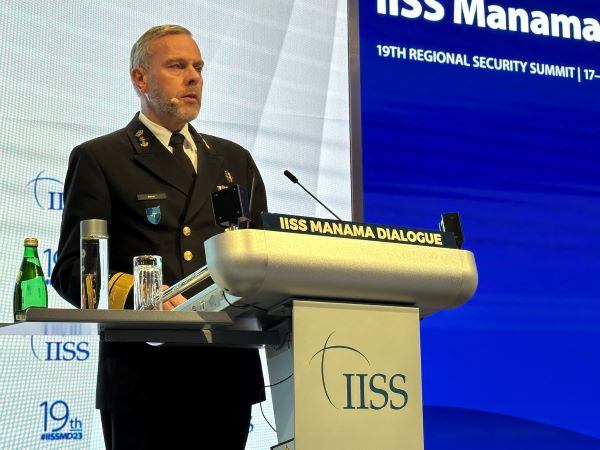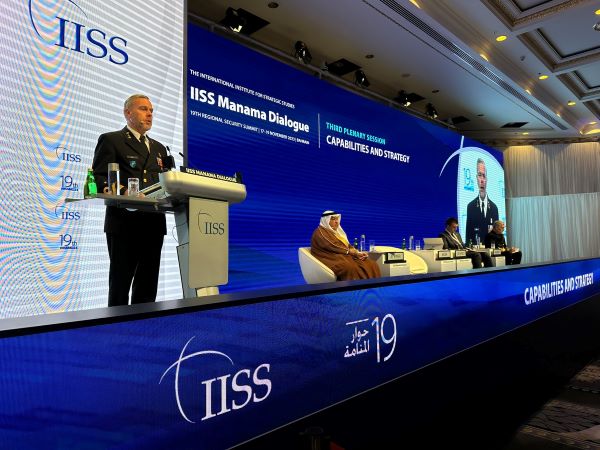
Rules-based international order still only way to promote peace, stability

By Habib Toumi
MANAMA: NATO Military Committee Chair Admiral Rob Bauer has warned that the rules-based international order is under immense pressure and that the tectonic plates of power are shifting again.
“We all have a stake in upholding the rules-based international order,” he said as he addressed the 19th Manama Dialogue, an international security conference held in the Bahraini capital.
“The rules-based international order is still the only way to promote peace and stability in the world, and international cooperation is the best way to achieve that.”
The shifts dictate deepening partnerships and being ready at all times and in all places, he said.
“It is not we, but our adversaries who determine the timelines. We cannot determine a level of ambition for ourselves for when and where we participate in a conflict. We have to be ready for any kind of attack, in any domain, in any geographical area, at any time,” the admiral said.
“We have several military strategies and plans in place to protect ourselves now and in the future against the two main threats listed in the new Strategic Concept: Russia and terrorist groups. However, we cannot stop there. In order to fulfill the sacred task of protecting the one billion people on Allied soil, we want and need to invest more time and energy in our partnerships around the world.”
NATO, at its June 2022 summit in Madrid, announced its Strategic Concept for the Alliance that set out its priorities, core tasks and approaches for the next decade.
The 2022 Strategic Concept describes the security environment facing the Alliance, reaffirms its values, and spells out NATO’s key purpose of ensuring collective defense for its Allies.
It further sets out NATO’s three core tasks of deterrence and defense; crisis prevention and management; and cooperative security.
The Strategic Concept identifies Russia as the most significant and direct threat to Allies’ security and to peace and stability in the Euro-Atlantic area.
It also identifies terrorism, in all its forms and manifestations, as the most direct asymmetric threat to the security of NATO citizens and to international peace and prosperity. It states that NATO will continue to counter, deter, defend and respond to threats and challenges posed by terrorist groups.
“Cooperation with partners is crucial because cooperative security is a core task of the Alliance, which eventually underpins our other two core tasks: collective defense and crisis prevention and management,” Bauer said.
“Military cooperation with partners means that you have access to new ways of working and different threat perceptions, and that you chip away at some of the unconscious bias we all have. If there is something we have all learned from the last couple of years, it is that the things you think will never happen can indeed happen.”
Bauer said that in the run-up to the next NATO summit in Washington in 2024, NATO is actively looking for ways to strengthen and deepen its partnerships in its southern neighbourhood
“We are not starting from scratch. We have decades of cooperation to build on, ranging from information exchange, military education and training, to operating side by side in a NATO mission or operation. We are closely cooperating with our partners in the frameworks of the Istanbul Cooperation Initiative (ICI) and the Mediterranean Dialogue (MD). Our ties are close also in times of need. A friend in need is a friend indeed.”
In 2004, NATO launched the ICI to “contribute to long-term global and regional security by offering Gulf Cooperation Council (GCC) countries practical bilateral security cooperation with NATO.”
Kuwait joined the ICI in December 2004, followed by Bahrain and Qatar in February 2005 and the UAE in June 2005.
The Mediterranean Dialogue was launched in December 1994, with countries in North Africa and eastern Mediterranean.

“With the global security environment being as volatile as it is, I believe it is time we intensify our partnerships and take them to the next level. Why? Because we all have a stake in upholding the rules-based international order,” Bauer said in his address.
“This order was created after two world wars, and now, the tectonic plates of power are shifting again, and we have to be careful not to forget the lessons of the past.”
He stressed that great power competition should not be fought on the battlefield and that it needs to be resolved through diplomacy, and if that fails, in the court room.
Bauer, a Dutch admiral who was the Chief of Defense before his current NATO post, highlighted that he and millions of people joined the army not because they believed war was the answer, but rather because strong deterrence is the best way to prevent war.
“Military cooperation creates strong deterrence for all parties included. That is why NATO wants to deepen its partnerships in its Southern neighborhood.,” he said.
“We are keen on cooperating more, for instance, in the areas of maritime security, counterterrorism, border security, cyber defense, counter improvised explosive devices, climate change, migration, food and energy, security … Every difficult path is best walked together.”
Looking forward, Baier stressed that modern warfare is just as much about bits and bots as it is about mud and blood.
“Armed forces around the world need to work on finding the right balance between larger volumes of low-tech and smaller volumes of high-tech weapons.
Looking forward, Bauer said there was an urgent need to work on a balance between higher volumes of low-tech and lower volumes high-tech weapons, bidding quality against quantity.
“In order to be effective, you need both,” he said.
“Modern warfare cannot be only about artificial intelligence, quantum computing and robotics. The human factor is just as important. If nothing else, it is the only way to assess not only what is happening, but also why.
Speaking of the human factor, the NATO Military Committee Chair stressed the importance of close cooperation between the top political and military level in the modernisation of defence capabilities.
“Close cooperation and consultation between the political and military levels allows us to ensure that what is politically desirable is indeed militarily feasible, and the other way around,” he said.
This allows the politically desirable to be indeed militarily feasible and the other way around, he added and referred to how NATO has institutionalized such an approach.
“Coordination with the political level not only leads to a better and faster decision-making process, it also enables military capabilities to be part of a whole-of-government approach. This is truly essential in the current security environment,” Bauer said.
“Every difficult path is best walked together. There is nothing idealistic about that. It is realistic, and I look forward to seeing how our partnerships will evolve in the future.”


